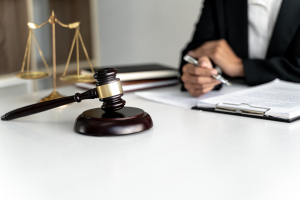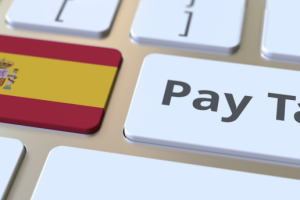Fight against Financial Crimes during the COVID-19 Pandemic
Preliminary remark
Money laundering and the related financing of terrorism and organised crime remain – also during the Coronavirus (COVID-19) crisis - significant problems at international level, thus damaging the integrity, stability and reputation of the financial sector.
Money laundering and the financing of terrorism are financial crimes with economic effects. Anti-money laundering and combating the financing of terrorism (AML/CFT) controls, when effectively implemented, mitigate the adverse effects of criminal economic activity and promote integrity and stability in financial markets.
Briefly described, “money laundering” is the process by which proceeds from a criminal activity are disguised to conceal their illicit origin.
“Terrorist financing” involves the solicitation, collection or provision of funds with the intention that they may be used to support terrorist acts or organisations. Funds may stem from both legal and illicit sources. The primary goal of individuals or entities involved in the financing of terrorism is therefore not necessarily to conceal the sources of the money but to conceal both the financing and the nature of the financed activity.
The fight against money laundering and terrorist financing is essential to protect the integrity of markets and of the global financial framework. Among the goals of this effort are also cutting off the resources available to terrorists and making it more difficult for those engaged in crime to profit from their criminal activities.
The importance of combating terrorist financing
As specified by the Financial Action Task Force (FATF) - the global money laundering and terrorist financing watchdog - terrorists need money and other assets, for weapons but also training, travel and accommodation to plan and execute their attacks and develop as an organisation. Disrupting and preventing these terrorism-related financial flows and transactions is one of the most effective ways to fight terrorism. Not only can it prevent future attacks by disrupting their material support, the footprints of their purchases, withdrawals and other financial transactions can provide valuable information for ongoing investigations.
Countering terrorism financing is therefore an essential part of the global fight against terror threat. As terrorists and terrorist groups continue to raise money with use of various means, countries must make it a priority to understand the risks they face from terrorist financing and develop policy responses to all aspects of it.
The impact of COVID-19
The COVID-19 pandemic continues to have a profound impact on our society. Terrorists – like all criminals – have sought to profit from COVID-19, to make money, strengthen their base and to fuel division.
Criminals persist in exploiting the pandemic, with mounting cases across the globe of counterfeiting of medical goods, investment fraud, adapted cyber-crime scams and exploitation of economic stimulus measures put in place by governments. At the same time, the pandemic has severely impacted some government and private sector ability to implement measures to detect, prevent and investigate money laundering and terrorist financing.
New technologies have helped the private sector adapt to the pandemic, for example using digital forms of identity to enable non-face-to-face interaction with customers. Other digital solutions could support information sharing and detection and analysis of suspicious activities.
Criminals and violent extremists are exploiting the pandemic to build their support networks, undermine trust in government and even weaponise the virus, according to a research report “Stop the virus of disinformation - The risk of malicious use of social media during COVID-19 and the technology options to fight it”(1) published in November 2020 by the United Nations Interregional Crime and Justice Research Institute. In particular, the report said, among other things, the following: (i) terrorist, violent extremist and organised criminal groups are trying to take advantage of the Coronavirus (COVID-19) disease pandemic to expand their activities and jeopardise the efficacy and credibility of response measures by governments; (ii) it is also alarming that some terrorist and violent extremist groups have attempted to misuse social media to incite potential terrorists to intentionally spread COVID-19 and to use it as an improvised form of a biological weapon; (iii) social media could be used to “inspire terrorism”, motivating self-radicalised terrorists to perpetrate real attacks; (iv) there are cases in which right-wing extremist groups, like CoronaWaffen, explicitly asked their followers to spread the virus by coughing on their local minority or by attending to specific places where religious or racial minorities gather. Other groups, such as Eco-Fascist Central, advocate to spread the coronavirus disease in countries with large populations or high levels of pollution. Additionally, CoronaWaffen has posted several online surveys on social media and messaging apps asking people if they had spread the virus.
Focus on money laundering and corruption
Corruption has the potential to bring catastrophic harm to economic development, the fight against organised crime and respect for the law and effective governance.
Corruption and money laundering are intrinsically linked. Corruption offences, such as bribery or theft of public funds, are generally committed for the purpose of obtaining private gain. Money laundering is the process of concealing illicit gains that were generated from criminal activity.
The links between corruption and money laundering are the following:
• money laundering schemes make it possible to conceal the unlawful origin of assets. Corruption is a source of money laundering as it generates large amounts of proceeds to be laundered. Corruption may also enable the commission of a money laundering offence and hinder its detection, since it can obstruct the effective implementation of a country's judicial, law enforcement and legislative frameworks;
• when countries establish corruption as a predicate offence to a money laundering charge, money laundering arising as a corrupt activity can be more effectively addressed. When authorities are empowered to investigate and prosecute corruption-related money laundering they can trace, seize and confiscate property which is the proceeds of corruption and engage in related international cooperation;
• when corruption is a predicate offence for money laundering, anti-money laundering preventive measures can also be more effectively leveraged to combat corruption.
While the COVID-19 pandemic is causing unprecedented social and economic impacts across the globe, corruption continues to pose a threat to economic growth, sustainable development and trust between governments and citizens. The importance of stopping money laundering to combat corruption must be stressed. Corruption will continue as long as it remains profitable. This is particularly important during the current global crisis, as money is flowing out of economies at precisely the time health services need it most.
Focus on money laundering and illegal wildlife trade
The illegal wildlife trade (IWT) is a major transnational organised crime, which generates billions of criminal proceeds each year.
IWT fuels corruption, threatens biodiversity, and can have a significant negative impact on public health and the economy.
Wildlife traffickers exploit weaknesses in the financial and non-financial sectors, to move, hide and launder their proceeds, enabling further wildlife crimes and damaging financial integrity. One of the most effective ways to identify the broader criminal networks and take the profit out of this crime, is to follow the financial trails of wildlife traffickers. Despite this, jurisdictions rarely investigate the financial trail left by this crime.
Under the FATF Report “Money Laundering and the Illegal Wildlife Trade” published on 25 June 2020, to combat the financial flows from the illegal wildlife trade, countries should therefore as a priority: (i) identify and assess their money laundering risks relating to the illegal wildlife trade; (ii) ensure that national laws and powers for law enforcement allow authorities to go after the finances of wildlife traffickers and to pursue financial investigations. The private sector also has an important role to play in combatting financial flows from the illegal wildlife trade.
The trafficking of wildlife is increasingly recognised as both a specialised area of organised crime and a significant threat to many plant and animal species.
The UNODC World Wildlife Crime Report 2020(2) highlights that the COVID-19 pandemic has shown that wildlife crime is a threat not only to the environment and biodiversity, but also to human health. When wild animals are poached from their natural habitat, butchered and sold illegally, the potential for transmission of zoonotic diseases - those caused by pathogens that spread from animals to humans - is increased.
Zoonotic diseases represent up to 75 per cent of all emerging infectious diseases and include SARS-CoV-2 that caused the COVID-19 pandemic. The products offered from the trafficked species for human consumption, by definition escape any hygiene or sanitary control: as such, they pose even greater risks of infectious diseases. The report notes that pangolins, which were identified as a potential source of coronaviruses, are the most trafficked wild mammals in the world, with seizures of pangolin scales having increased tenfold between 2014 and 2018.
Wildlife crime affects all countries through its impacts on biodiversity, human health, security and socio-economic development. Stopping trafficking in wildlife species is a critical step not just to protect biodiversity and the rule of law, but to help prevent future public health emergencies.
Conclusions
With criminals attempting to exploit the COVID-19 pandemic for their own ends, the international community must respond with stronger collective action and cooperation(3).
By Barbara Bandiera
Lawyer, President of the UIA Compliance and AML Sub-committee
Milan, Italy
----------------
(1) http://www.unicri.it/sites/default/files/2020-11/SM%20misuse.pdf
(2) https://www.unodc.org/documents/data-and-analysis/wildlife/2020/World_Wildlife_Report_2020_9July.pdf
(3) Main sources of the article: FATF, International Monetary Fund and United Nations






